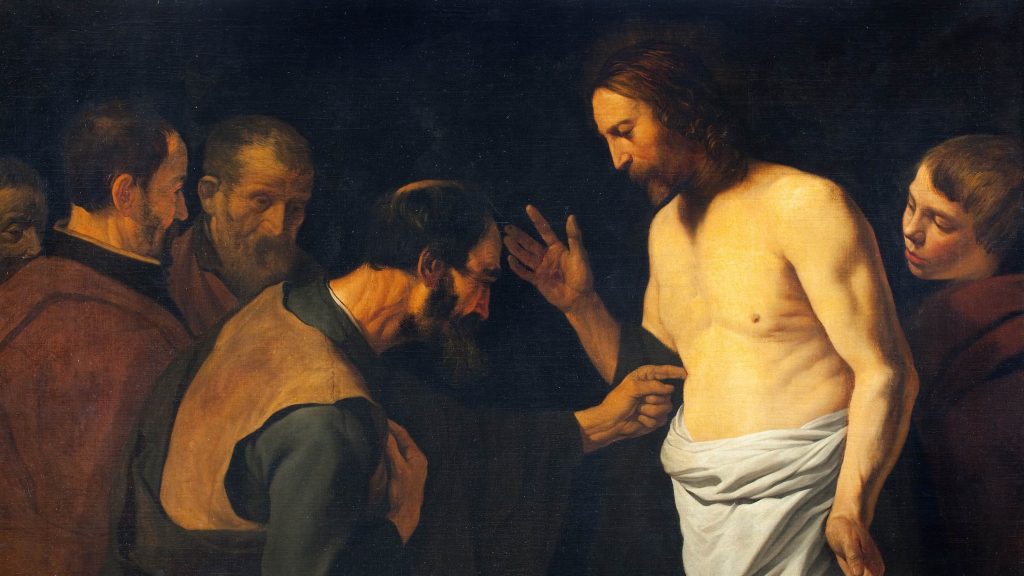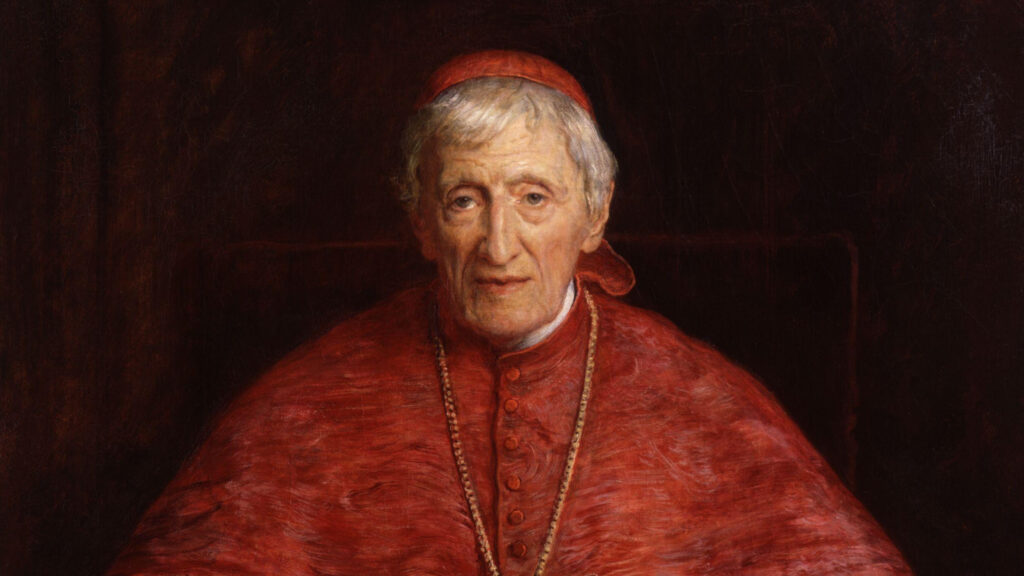
Mass Readings for the 2nd Sunday of Easter:
Acts 4.32-35 Psalm 118 1 John 5.1-6 John 20.19-31
As a Catholic pastor I get to interview a lot of people about their understanding of the Christian faith. Through pastoral references for those who want to teach in the publicly-funded Catholic school system, in sacramental preparation—talking to parents about the baptism of their children; students about their first communion, their confirmation; couples about their upcoming wedding, and so on. In the confessional, there too, is an opportunity to get a sense of how people understand the faith. The RCIA, that is the preparation of adults for baptism and confirmation, and for the reception into the Church from other Christian communities, this offers a look into what you might call the “popular” theology of Christianity.
As a protestant minister, I didn’t have anywhere near these kinds of opportunities.
Now what I have to say is going to sound like a criticism, and in a sense, it is. Let me first say that almost all these folks are by and large, good-hearted, they do have faith in Christ, they are trying to be His disciples; they’re earnest.
Lately, I’ve grown inclined to move quickly to the point in these talks, to be blunt, to just ask it straight up: what is the Christian faith as you understand it?
Now I do get some very good answers. I hear about forgiveness, and mercy, and service, and sacrifice for others as essential elements of the Christian life. All really good stuff. Some are clever enough to rummage through the clauses of the Apostles’ Creed; not a bad way to review what the faith is about because, well, that’s what the creed is there for.
Do you know what I’ve never heard anyone speak of? The Resurrection; and in that I mean both the Easter rising of our Lord from the dead, and our resurrection which is absolutely tied to Christ’s.
This isn’t to say they don’t believe in the Resurrection, it’s just that it doesn’t appear to the be an idea they start from, a foundation of their faith, or rather, like the foundation of a house, it’s not given any thought until something goes wrong and there’s water in the basement.
And I’ll say this: there’s not only water in the Church’s basement, but there are cracks everywhere in the walls; and I can’t help but guess that the issue is the Resurrection and it no longer being consciously part of the faith of many.
And I think that’s the result of the unacknowledged schism within our Western civilization. We all know about the Reformation and Counter-Reformation as a great split, but within that divide, on both sides of the Protestant/Catholic split we can readily detect the schism between cultural Christianity and what I might call, ecclesiastical Christianity—those who go to church and those who don’t, yet all understand themselves to have a connection to Christ in terms of their values, their sense of the good.

Last week I did a graveside funeral service, and at those people are able to offer their remarks as a kind of eulogy; and one of the speakers expressed sentiments I’ve heard so many times in just that situation: doubt about life after death, heaven, a God who keeps the souls of the faithful departed in His care. Again, this wasn’t some monster speaking, but a fellow member of this shared civilization who respectfully bows the head at the prayers but hasn’t any sense of the reality of the God we pray to, or of the reasonable hope we should have, or of the reality of the Resurrection that is foundation of that hope. The faithful and those who’ve drifted away find common ground in the things that derive from Christ’s resurrection, but we don’t share in the belief in that source.
I’ve previously mentioned Tom Holland’s book, Dominion; and one of its central conclusions. Holland’s not a man of faith, but an historian of great integrity, and he says of Western civilization, and all who belong to it, that they are unconscious Christians. Maybe not good Christians, but Christians nonetheless. He says that because of his deep and broad knowledge of the pre-Christian era and how any notion that our beliefs in inherent human dignity, human rights, democratic practices, and so on derive from the ancient world, from democratic Athens in particular, is utter nonsense. Secularists, desperate to discount Christianity’s legacy often look to pagan Greece of antiquity as the font of our civilization, but Holland is quick to disabuse. Anything we think we see there as the progenitor of what we have today is just so much projection. The ancient world was brutal, and into that merciless world came the Gospel, and news of the Resurrection.
Today we’re reading quite a bit from St. John; a letter and a portion of his gospel. These are said to reflect, not just the thoughts and remembrances of St. John, the youngest of the apostles, but the community he led in his years at Ephesus where he made his home and cared for our lady Mary.
The scholarly consensus about the gospel is that it is the last of the four in our Bible to be written, and that was at the end of the Apostolic age. The oldest fragment of this gospel, indeed, it’s the oldest fragment of any of the gospels ever found, dates from around 110 A.D. A reasonable chronology is that John began to write his account in the late 80s or early 90s as he entered old age.
If you sit down and read the four gospels in succession, you’re going to notice how different the Gospel of John is.
What is really striking about John, gospel and letter writer, is that he is utterly forthright about who Jesus is, and who God is. It has an almost brash tone to it in comparison to the other gospels of the biblical canon. And the argument is well made that John is writing in reaction to the other gospels that were well in circulation among the early churches, that he knew at least one.
Now John does not contradict Matthew, Mark and Luke. However, we see him bringing out other stories, and stressing other themes of Jesus’ ministry. Where, for example, the other three pick up on the theme of secrecy, John portrays Jesus as being really an open secret, and one suspects that Jesus’ telling his disciples to keep quiet had less to do with covering up what was obvious than keeping their own half-formed speculations to themselves and not confusing people Jesus wanted to reach.
We still have a lot of those people willing to offer their half-baked ideas about what true Christianity is, to modernize it, reform it, make it more palatable.

Another striking differences from the earlier gospels is the progression in the insistence on the substantial reality of the Resurrection: in Matthew and Mark, no details of the encounters with the resurrected Lord. Luke comes a little later, and we have the first story of Jesus demonstrating the reality of the resurrected body. In John, we have the story of Jesus telling the apostles to stick their fingers in His wounds, to put their hands into His side! John who was there, has come to the conclusion that the sensitivities of his audience about blood and gore have to be ignored, and the real, visceral experience of seeing Jesus Christ risen from the dead needs to be communicated unambiguously. Why? We can only speculate, but clearly, as the Church emerged from out of the Jewish community, as it met the pagan religious world, as it moved in time away from the foundational event of the Resurrection, affirming the reality of it became an urgent matter so that the Gospel was championed, not as just another religion derived from myth, but as truth that has come in history.
A great temptation is to make a Christianity that compartmentalizes the Resurrection, sequesters it, so to speak, as something we can settle in our minds later so that we can “believe” the other good things we hear in the Gospels. You can’t customize it. It’s a package.
To make of this faith a religion of neighbourliness and good works is to miss the point of it: that it is about the eternal salvation of souls, and fulfilment of our brief lives in entering into the fullness of life with God. Focus on that, and all the other good things come along. Jettison it, and the other things begin to fall away, as we’ve seen in a society grown decadent, corrupt, where we see lately disturbing rationalizations being offered for violence, persecution, retribution, in the name of some twisted notion of justice.
Absent the Resurrection, it’s easy to strip out the commandments, eliminate the discipline of piety and study of the faith, the practice of self control, and true sacrifice of self.
It is surmised then that we will have a reasonable way of life. We can all enjoy our little time in pleasurable pursuits, follow the golden rule and go to our graves with some small sense of satisfaction at having spent our time well. But if the Resurrection is real, our practical compromises with the world are what is false.
John in his epistle today says that’s not going to work: you need to love God, and obey His commandments. Love Him because it is His love that raises us from the dead.
Another Saint John, Saint John Henry Newman, in a sermon spoke of the unattractiveness of Christianity, authentically lived Christianity to the outsider; and he saw in a lot of the English aristocracy of his day, to whom he preached, exhibitions of nominal Christianity, a Christianity of social propriety and keeping up of appearances; a virtue-signalling kind of faith.

He said, “The very terms ‘religion,’ ‘devotion,’ ‘piety,’ ‘conscientiousness,’ ‘mortification,’ and the like, you find to be inexpressibly dull and cheerless: you cannot find fault with them, but you would if you could…”
His point was from the outside, it does look too hard and is without obvious benefit. As fellow Englishman G.K. Chesterton quipped famously, “The Christian ideal has not been tried and found wanting. It has been found difficult; and left untried.”
I would say that the problem lies in the Resurrection and belief in it. I hope and pray that among the churchgoing it is a matter of misunderstanding; I fear among those absent, it is a lack of faith; and much of that comes from the Church’s failure to effectively proclaim it; explain it, invite others into the mystery of it.
If we could bring to all an understanding of how the victory of God who is love is seen fully in the Resurrection; and how it is both a real event and a real invitation to us all; then our love of God as expressed in keeping His commandments is no great challenge, and words like ‘piety’ and ‘devotion’ won’t seem dull but are seen as expressions of unspeakable joy.
Amen.